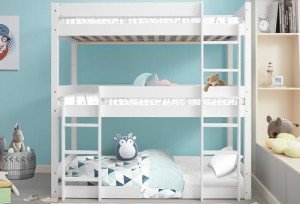Bunk Beds for Kids: A Comprehensive Guide
Bunk beds have been a popular choice for children's bed rooms for several years. They offer a space-saving service that makes the most of floor area, supplies fun climbing up alternatives, and is available in a variety of styles that appeal to kids's creativities. This short article explores the advantages, considerations, designs, and safety features related to bunk beds for children.
Advantages of Bunk Beds
Bunk beds present several benefits that make them an appealing option for households. Here are some essential benefits:
Space Saving
- Bunk beds enable two or more kids to share a room without sacrificing space for play or other activities.
Cost-Effective
- Purchasing a single bunk bed can be more cost-effective than purchasing 2 separate beds.
Fun Factor
- Kids often see bunk beds as a fun location to sleep and play, fostering a sense of experience.
Adaptability
- Bunk beds are offered in various setups, consisting of L-shaped, loft beds, and even convertible styles that can change as children grow.
Company
- Numerous bunk beds come with built-in storage choices, such as racks and drawers, helping keep spaces organized.
Secret Considerations Before Purchasing
Before investing in a bunk beds for kids bed, it's important to consider specific factors, such as:
Space Requirements
Step the space to make sure that there suffices vertical space, permitting adequate headroom on the top bunk.Age of Your Children
Consider their age and maturity. Numerous manufacturers advise that kids under 6 need to not oversleep the top bunk due to security concerns.Weight Limit
It's vital to inspect the weight limits of the bunk bed for both the top and bottom bunks to make sure safety.Design Preferences
Choose a style that matches the space's design and the kids's choices.Material
Bunk beds are available in various materials, such as wood or metal. Each has its advantages and downsides regarding toughness and aesthetics.
Styles of Bunk Beds
Bunk beds can be found in different designs to fit various visual appeals and functional requirements. Here's a list of some popular designs:
Standard Bunk Beds
Traditional stacked beds that include 2 beds built one above the other.Loft Beds
A bed raised high off the ground, with space underneath for a desk, play area, or storage.L-Shaped Bunk Beds
2 beds organized in an L-shape, offering more flooring space and a distinct design element.Twin Over Full Bunk Beds
These options include a twin bed on leading and a full-sized bed on the bottom, accommodating older children or adults.Triple Bunk Beds
Developed for three children, these beds usually include three stacked beds, suitable for bigger households.
Security Features to Consider
Making sure the security of kids using bunk beds is critical. Here are some safety includes to look for before making a purchase:
Guardrails
A bunk bed must consist of sturdy guardrails on the leading bunk to avoid unintentional falls.Ladders
Guarantee that the ladder is firmly connected and simple for children to browse safely.Stability
Look for bunk beds with lower center of mass and wide bases to provide better stability.Quality Construction
Select beds made from durable products that fulfill security standards, such as ASTM (American Society for Testing and Materials) policies.
Frequently Asked Questions About Bunk Beds
1. What age is suitable for a top bunk?Generally, children aged 6 and older are advised for oversleeping the top bunk. 2. Are bunk beds safe for toddlers?Most specialists advise against
putting young children in the top bunk due to the
threat of falls and incorrect ladder usage. 3. Can bunk beds be separated?Many bunk beds are developed to be separated into 2 standalone beds,
supplying added versatility as children grow
. 4. How do I keep a bunk bed?Regularly check for loose screws and use, keep bed mattress clean, and ensure that the bunk bed is
stable to prolong its lifespan. 5.
Exist any special bed mattress requirements for bunk beds?Yes, bed mattress for bunk beds must fit snugly without leaving gaps. Usually, thinner bed mattress
(around 6 to 8 inches )are advised for leading bunks for security. Bunk beds provide a versatile, useful, and fun solution for kids's sleeping plans, maximizing space while accommodating several kids in one room. By considering the essential elements of design, safety, and space, parents can make a notified choice when picking the best bunk bed for their children's requirements. With the right care and maintenance, a bunk bed can be a beloved piece of furnishings that provides years of use and pleasure for kids. Summary Table of Bunk Bed Styles Design Description Best For Standard Bunk Beds Classic design, two stacked beds Smaller spaces Loft Beds Raised bed with open space underneath Research study or play locations L-Shaped Bunk Beds 2 beds in an L-shape Added floor space Twin Over Full Twin on the top,
full on bottom Accommodating older children Triple Bunk Beds Three stacked beds Larger families By comprehending the numerous options available, designated factors to consider for safety and performance, and proper age guidelines, households can choose the best bunk bed that not only enhances their home however also makes sure a safe and satisfying sleeping environment for their kids. 







